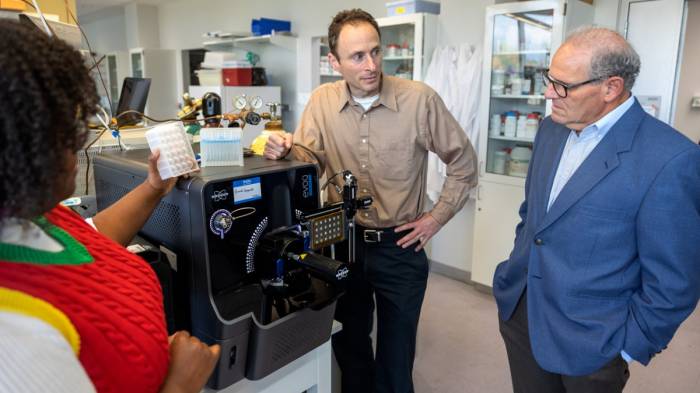New Grape Testing Technology Cuts Screening Time by 90% at World’s Largest Winery
Cornell and E&J Gallo partnership yields breakthrough platform, streamlining harvest operations and enhancing wine quality control
2025-11-11

During the busy harvest season at E&J Gallo Winery in Modesto, California, staff collect up to 300 grape samples each day. These samples are tested to ensure the wine is free from harmful toxins and unwanted flavors, such as those caused by wildfire smoke or certain molds. For years, this process has been a challenge for the winery, which is the largest exporter of California wines and one of the world’s biggest wine producers by volume. Even with automated machines working around the clock, testing so many samples could take several days and required constant staff oversight.
Nick Dokoozlian, vice president of viticulture, chemistry and enology at Gallo, described the testing process as a bottleneck that slowed down operations. The company needed a faster way to screen grapes but had no clear solution. After a decade of collaboration with Cornell University, a breakthrough has arrived. Gavin Sacks, professor of food science at Cornell’s College of Agriculture and Life Sciences, led a team that developed a new high-throughput analytical platform called SPMESH-DART. This technology reduces screening time from 30 or 40 minutes per sample to just three or four minutes.
The SPMESH-DART system was first used at Gallo’s Modesto facility in October. The technology works by using a laser-etched polymer sheet that can absorb volatile compounds from grape samples. The sheet is placed between two metal plates and can process 24 samples at once. After absorption, the compounds are measured and identified using established methods. This approach allows for rapid detection of compounds that affect wine flavor and aroma, even at very low concentrations.
Gallo worked with German instrumentation company Bruker to integrate the new process with existing laboratory equipment. According to Sacks, developing SPMESH-DART required many small improvements over time and close collaboration between university researchers and industry professionals. Dokoozlian emphasized that such fundamental research is essential for innovation in the wine industry and said that no other U.S. university is better equipped than Cornell to tackle these challenges.
The new platform not only speeds up testing but also reduces operational complexity for Gallo. Staff can now focus on more strategic tasks instead of spending hours monitoring sample analysis. Gallo plans to use the technology on a larger scale in future harvests.
Currently, Gallo uses SPMESH-DART to detect compounds that influence wine flavor and aroma. Sacks’ team is also working with Gallo to seek federal approval for using the technology to screen for harmful toxins in grapes. The partnership between Cornell and Gallo has provided real-world research opportunities for students and has become a pipeline for employment in the food industry. Many Cornell graduates hold leadership and research positions at Gallo, and the company recruits several student interns from Cornell each year.
Sacks said that working with industry partners like Gallo gives his students valuable experience with real research questions and practical constraints. He believes that food science departments should remain connected to industry to ensure their work remains relevant.
Gallo’s support for Cornell extends beyond research collaborations. The company has helped establish the National Grape Improvement Center at Cornell AgriTech and funds annual conferences for grape and wine professionals in New York and internationally. Gallo also supports projects focused on vineyard efficiency and nutrition.
Dokoozlian credits Cornell’s unique combination of agricultural expertise within an Ivy League setting as key to their successful partnership. He said that between its students and faculty, Cornell has both national and international influence in the grape and wine industry.
The development of SPMESH-DART marks a significant step forward for both Gallo Winery and the broader wine industry, offering faster, more efficient ways to ensure quality and safety in winemaking.
Founded in 2007, Vinetur® is a registered trademark of VGSC S.L. with a long history in the wine industry.
VGSC, S.L. with VAT number B70255591 is a spanish company legally registered in the Commercial Register of the city of Santiago de Compostela, with registration number: Bulletin 181, Reference 356049 in Volume 13, Page 107, Section 6, Sheet 45028, Entry 2.
Email: [email protected]
Headquarters and offices located in Vilagarcia de Arousa, Spain.